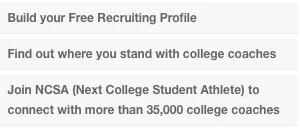Towson Head Coach Advocates Fines for APR Punishment
Towson head coach Pat Skerry has reason to be miffed at the Academic Progress Rate and the postseason ban imposed on his program as a result, but his solution leaves something to be desired:
“Trust me, we’re all for academic reform,” said Skerry, adding that his scholarship players earned a 2.94 GPA in the fall. “But I think there’s a better way to institute this rule, where you can punish coaches, administrators and fine institutions, rather than penalize kids who have nothing to do with it. I wish they would hit schools more in the pocketbook.”
Fines rather than traditional NCAA punishments have become a borderline obsession with would-be reformers because of the perception that a) they do not hurt innocent parties and b) that money drives everything, so fines will have a big impact.
But fines suffer many of the same draw backs. If fines are too onerous, then eventually they start to hurt innocent parties. Cut backs are made, sports are dropped, services are reduced. Plenty of people would argue that athletes are harmed if, say, because of a fine, their head coach cannot be retained when a larger school comes calling.
How big a fine has to be to make a difference is another unknown. $60 million over four years does not seem to be enough to reduce Penn State’s competitiveness. Spending restrictions would be more direct and power, but would raise the same questions about the impact on innocent parties as excessive fines.
If NCAA penalties do not require schools to give up their ill-gotten gains and do not directly affect the ability of the school to compete going forward, then the fine becomes a cost of doing business. The cost-benefit analysis of cheating becomes even easier since the cost will be easier to calculate and plan for.
On top of those issues, fines are the least appropriate in the context of the APR. If we are serious about academic reform, then allowing schools to forego educating athletes in exchange for a cash payment is the wrong approach. Financial penalties deserve more consideration than they have received, but need to be used along with the penalties that strike at the heart of how competitive a team is.


